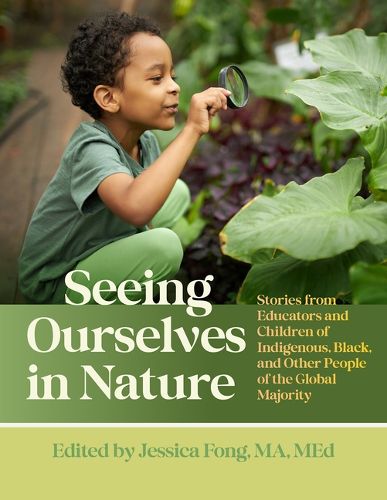Readings Newsletter
Become a Readings Member to make your shopping experience even easier.
Sign in or sign up for free!
You’re not far away from qualifying for FREE standard shipping within Australia
You’ve qualified for FREE standard shipping within Australia
The cart is loading…






Discover the profound and joyous stories of Black and Brown nature educators. In Seeing Ourselves in Nature, author Jessica Fong asks how educators in the United States who are Black, Indigenous, or other people of color can create space for predominantly BIPOC children and families to reconnect to nature. Recognizing the scarcity of stories from people of color in the predominately white literature surrounding nature education in the United States, Fong sought out thirteen other BIPOC educators to share their rich and profound experiences with young children in nature. Sharing these stories is a first step in the long road to making nature education equitable for all children.
In section one, educators work toward liberation and justice by actively pushing against the pushdown of academics on children of color. In section two, community and cultural connections based in nature come to the forefront as educators share the importance of seeing Black and Brown faces in natural spaces both in real life and in the images found in books. In section three, prose and poetry stories from Black women become radical by virtue of their simplicity as they connect the students and families they serve by centering their experiences with nature. In section four, children harness their powerful curiosity and intrinsic motivation when interacting with nature.
$9.00 standard shipping within Australia
FREE standard shipping within Australia for orders over $100.00
Express & International shipping calculated at checkout
Discover the profound and joyous stories of Black and Brown nature educators. In Seeing Ourselves in Nature, author Jessica Fong asks how educators in the United States who are Black, Indigenous, or other people of color can create space for predominantly BIPOC children and families to reconnect to nature. Recognizing the scarcity of stories from people of color in the predominately white literature surrounding nature education in the United States, Fong sought out thirteen other BIPOC educators to share their rich and profound experiences with young children in nature. Sharing these stories is a first step in the long road to making nature education equitable for all children.
In section one, educators work toward liberation and justice by actively pushing against the pushdown of academics on children of color. In section two, community and cultural connections based in nature come to the forefront as educators share the importance of seeing Black and Brown faces in natural spaces both in real life and in the images found in books. In section three, prose and poetry stories from Black women become radical by virtue of their simplicity as they connect the students and families they serve by centering their experiences with nature. In section four, children harness their powerful curiosity and intrinsic motivation when interacting with nature.